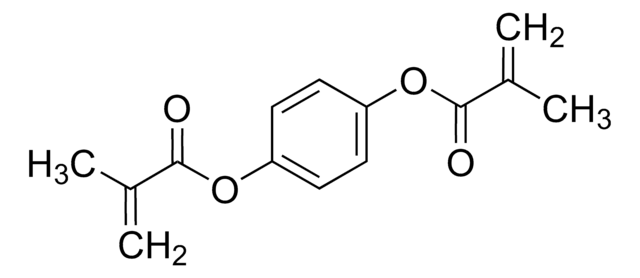494356
Bisphenol A glycerolate dimethacrylate
glycerol/phenol 1
Synonyme(s) :
2,2′-Bis[4-(3-methacryloxy-2-hydroxypropoxy)phenyl]propane, 2,2′-Bis[4-(3-methacryloyloxy-2-hydroxypropoxy)phenyl]propane, 2,2-Bis[p -(3-methacryloxy-2-hydroxypropoxy)phenyl]propane, 2,2-Bis[p -[2-hydroxy-3-(methacryloxy)propoxy]phenyl]propane, Bisphenol A bis(2-hydroxy-3-methacryloxypropyl) ether
About This Item
Produits recommandés
Composition
glycerol/phenol, 1
Niveau de qualité
Indice de réfraction
n20/D 1.552 (lit.)
Densité
1.161 g/mL at 25 °C (lit.)
Température de stockage
2-8°C
Chaîne SMILES
CC(=C)C(=O)OCC(O)COc1ccc(cc1)C(C)(C)c2ccc(OCC(O)COC(=O)C(C)=C)cc2
InChI
1S/C29H36O8/c1-19(2)27(32)36-17-23(30)15-34-25-11-7-21(8-12-25)29(5,6)22-9-13-26(14-10-22)35-16-24(31)18-37-28(33)20(3)4/h7-14,23-24,30-31H,1,3,15-18H2,2,4-6H3
Clé InChI
AMFGWXWBFGVCKG-UHFFFAOYSA-N
Description générale
- Phenyl ring provides chemical resistance
- Ether linkage allows flexibility
- Hydroxyl group gives good adhesion
- Methacrylate is the reactive site for crosslinking
Application
- As a crosslinking monomer in the preparation of zwitter ionic monolithic columns for liquid chromatography.
- In the preparation of an antibacterial dental adhesive.
Mention d'avertissement
Danger
Mentions de danger
Conseils de prudence
Classification des risques
Aquatic Chronic 3 - Eye Dam. 1 - Skin Sens. 1
Code de la classe de stockage
10 - Combustible liquids
Classe de danger pour l'eau (WGK)
WGK 2
Point d'éclair (°F)
230.0 °F
Point d'éclair (°C)
110 °C
Faites votre choix parmi les versions les plus récentes :
Déjà en possession de ce produit ?
Retrouvez la documentation relative aux produits que vous avez récemment achetés dans la Bibliothèque de documents.
Les clients ont également consulté
Notre équipe de scientifiques dispose d'une expérience dans tous les secteurs de la recherche, notamment en sciences de la vie, science des matériaux, synthèse chimique, chromatographie, analyse et dans de nombreux autres domaines..
Contacter notre Service technique















